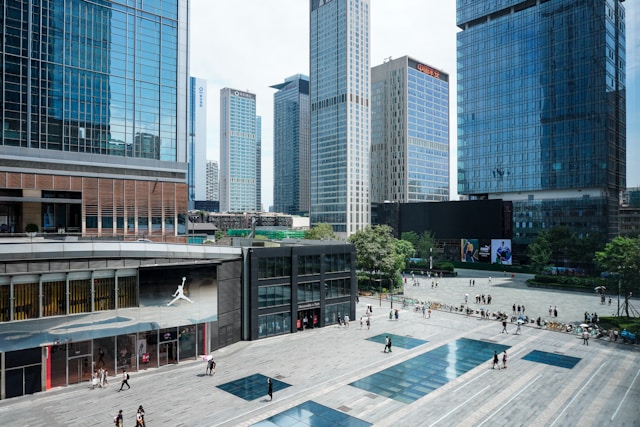
In the previous post, we have introduced some of China’s performances in "Doing Business 2020" ("Report 2020") published by the World Bank Group. Now I’m going to move on to the data related to Enforcing Contracts in this Report.
The “Enforcing Contracts” data depict the quality of commercial dispute settlement in various countries, among which China ranks fifth.
I will select several countries and regions as samples and compare their performance with that of China.
I. Sample Selection
I have picked eight countries and regions as samples, including the US, the UK, France, Japan, Korea, Singapore, Hong Kong, and Norway. Among them, New Zealand, Singapore, and Hong Kong are the overall top three countries in Report 2020; Singapore, Korea, and Norway are the top three in the single ranking of Enforcing Contracts; the UK and the US are representatives of the common law system, while France and Japan are those of the civil law system.
The overall ranking of China and the above eight countries/regions in Report 2020 are as follows: New Zealand(1), Singapore(2), Hong Kong(3), Korea(5), the US(6), the UK(8), Norway(9), Japan(29), China(31), France(32).
The single ranking of Enforcing Contracts of these countries/regions in descending order: Singapore(1), Korea(2), Norway(3), China(5), France(16), US(17), Hong Kong(31), UK(34), Japan(50).
Below I will compare the performance of China and that of the eight other countries/regions in the three indicators of Enforcing Contracts, namely: time, cost, and quality of judicial processes index.
II. Time
The Time indicator reflects the efficiency of litigation and is, therefore, an important evaluation factor in the ranking of “Enforcing Contracts”.
Among the above nine countries and regions, New Zealand performs the best with a total time of 216 days, while China has the longest days of 485.
|
|
Total |
Filing and service |
Trial and judgment |
Enforcement of judgment |
|
China(Shanghai) |
485 |
35 |
210 |
240 |
|
US(New York City) |
370 |
30 |
240 |
100 |
|
UK |
437 |
30 |
345 |
62 |
|
France |
447 |
22 |
325 |
100 |
|
Japan |
360 |
20 |
280 |
60 |
|
Korea |
290 |
20 |
150 |
120 |
|
Hong Kong |
385 |
30 |
310 |
45 |
|
New Zealand |
216 |
7 |
167 |
42 |
|
Norway |
400 |
40 |
300 |
60 |
After analyzing the time cost in each stage of litigation, I have found that in the stages of "Filing and service" and "Trial and judgment", China comes out near the top, exceeding six other countries except for Korea and New Zealand. This indicates China has very high trial efficiency during the litigation.
However, in the stage of "Enforcement of judgment", China is at the bottom with the cost of 240 days, while the other countries/regions only need half or even 1/6 of the time of China. In fact, China has been putting great efforts to solve the problem of "difficulty of enforcement" (執行難), but to this day, China is still on its way (see the CJO's previous posts).
III. Cost
The Cost indicator is also very important to show the parties' ability to afford litigation. The World Bank Group uses “cost (% of claim value)” as an indicator of its assessment. Each item in the table below is a percentage.
China is one of the countries/regions with the lowest cost, lower than others except for Norway and Korea. The litigation cost in the UK has significantly surpassed that in all other countries/regions.
|
|
Total |
Attorney fees |
Court fees |
Enforcement fees |
|
China(Shanghai) |
15.1 |
7.6 |
5 |
2.5 |
|
US(New York City) |
22.9 |
14.4 |
5 |
3.5 |
|
UK |
45.7 |
35 |
9.5 |
1.2 |
|
France |
17.4 |
10.7 |
2.7 |
4 |
|
Japan |
23.4 |
18.5 |
4.5 |
0.4 |
|
Korea |
12.7 |
9 |
3 |
0.7 |
|
Hong Kong |
23.6 |
19.5 |
3.1 |
1 |
|
New Zealand |
27.2 |
22 |
2 |
3.2 |
|
Norway |
9.9 |
8 |
1.3 |
0.6 |
The attorney fee is the major factor of the cost gap. The UK has the highest attorney fees, while China has the lowest.
IV. Quality of judicial processes index
Quality of judicial processes index has a total score of 18 points, with 17 major questions divided into four indicators. China has the highest score of 16.5 points.
|
|
Total |
Court structure and proceedings |
Case management |
Court automation |
Alternative dispute resolution |
|
China(Shanghai) |
16.5 |
5.0 |
5.5 |
3.0 |
3.0 |
|
US(New York City) |
15.0 |
5.0 |
4.5 |
3.0 |
2.5 |
|
UK |
15.0 |
4.5 |
5.0 |
3.5 |
2.0 |
|
France |
12 |
4.5 |
3.0 |
2.0 |
2.5 |
|
Japan |
7.5 |
3.0 |
1.0 |
1.0 |
2.5 |
|
Korea |
14.5 |
3.5 |
4.0 |
4.0 |
3.0 |
|
Hong Kong |
10.0 |
4.5 |
2.0 |
1.0 |
2.5 |
|
New Zealand |
9.5 |
3.0 |
3.0 |
1.5 |
2.0 |
|
Norway |
14 |
3.5 |
4.0 |
4.0 |
2.5 |
1. Court structure and proceedings
This indicator includes the following 5 major questions:
(1) Is there a court or division of a court dedicated solely to hearing commercial cases?
(2) Small claims court
a. Is there a small claims court or a fast-track procedure for small claims?
b. If yes, is self-representation allowed?
(3) Is pretrial attachment available?
(4) Are new cases assigned randomly to judges?
(5) Does a woman's testimony carry the same evidentiary weight in court as a man's?
China gets “yes” to all questions, while the UK, France, Japan, Hong Kong, and New Zealand do not randomly assign cases to judges; and Korea, Japan, New Zealand, and Norway do not have commercial divisions or specialized courts.
2. Case management
This indicator is assessed with 6 major questions:
(1) Time standards
a. Are there laws setting overall time standards for key court events in a civil case?
b. If yes, are the time standards set for at least three court events?
c. Are these time standards respected in more than 50% of cases?
(2) Adjournments
a. Does the law regulate the maximum number of adjournments that can be granted?
b. Are adjournments limited to unforeseen and exceptional circumstances?
c. If rules on adjournments exist, are they respected in more than 50% of cases?
(3) Can two of the following four reports be generated by the competent court: (i) time to disposition report; (ii) clearance rate report; (iii) age of pending cases report; and (iv) single case progress report?
(4) Is a pretrial conference among the case management techniques used before the competent court?
(5) Are there any electronic case management tools in place within the competent court for use by judges?
(6) Are there any electronic case management tools in place within the competent court for use by lawyers?
China only gets a "No" to question (2) (c), i.e. "If rules on adjournments exist, are they respected in more than 50% of cases?" This shows that Chinese courts have not effectively followed the rules on the adjournment proceedings. However, other countries don’t perform well in this regard, either.
The countries/regions that fail to meet the standards of each question in this indicator are as follows:
Question (1): France, Japan(partly), Korea(partly), Hong Kong(partly), Norway(partly);
Question (2): China(partly), France, UK, Japan, Korea, Hong Kong, New Zealand, Norway;
Question (3): US;
Question (4): France;
Question (5): Japan, Hong Kong, New Zealand;
Question (6): Japan, Hong Kong, New Zealand.
3. Court automation
This indicator is divided into 4 major questions:
(1) Can the initial complaint be filed electronically through a dedicated platform within the competent court?
(2) Is it possible to carry out the service of process electronically for claims filed before the competent court?
(3) Can court fees be paid electronically within the competent court?
(4) Publication of judgments
a. Are judgments rendered in commercial cases at all levels made available to the general public through publication in official gazettes, in newspapers or on the internet or court website?
b. Are judgments rendered in commercial cases at the appellate and supreme court level made available to the general public through publication in official gazettes, in newspapers or on the internet or court website?
China gets "No" to question (1), which means that the online filing of complaints by Chinese courts has not yet been recognized by the World Bank Group. China has made remarkable progress in court automation construction and has led the world's developing direction, but it seems that there is still some way to go. At present, Chinese courts are increasing their investment in this area and have begun cross-region case docketing in 2019 (namely, the parties may submit the application to a court in one city for case docket to another court in a different city). It’s foreseeable that Chinese courts will perform better in this regard next year.
The countries/regions fail to meet the standards of each question in this indicator are as follows:
Question (1): China, France, Japan, Hong Kong, New Zealand;
Question (2): US, Japan, Hong Kong;
Question (3): Japan, Hong Kong, New Zealand;
Question (4): UK, France, New Zealand.
4. "Diversified Dispute Settlement "
This indicator has 2 major questions:
(1) Arbitration
a. Is domestic commercial arbitration governed by a consolidated law or consolidated chapter or section of the applicable code of civil procedure encompassing substantially all its aspects?
b. Are there any commercial disputes—aside from those that deal with public order or public policy—that cannot be submitted to arbitration?
c. Are valid arbitration clauses or agreements usually enforced by the courts?
(2) Mediation/Conciliation
a. Is voluntary mediation or conciliation available?
b. Are mediation, conciliation or both governed by a consolidated law or consolidated chapter or section of the applicable code of civil procedure encompassing substantially all their aspects (for example, definition, aim and scope of application, designation of mediator/conciliator, initiation of the process, principles governing the process, enforcement)?
c. Are there financial incentives for parties to attempt mediation or conciliation (i.e., if mediation or conciliation is successful, a refund of court filing fees, income tax credits or the like)?
China only gets a "No" to question (1) (b), i.e. "Are there any commercial disputes—aside from those that deal with public order or public policy—that cannot be submitted to arbitration?" This means that the World Bank Group believes that arbitration in China has not yet covered all commercial disputes that shall be covered.
In fact, the other eight countries/regions have the same answer "No" like China, which is understandable, since the scope of arbitrable matters is subject to each country/region’s needs.
The countries/regions fail to meet the standards of each question in this indicator are as follows:
Question (1) (b): China, the US, the UK, France, Japan, Korea, Hong Kong, New Zealand, Norway;
Question (2) (b): the UK, New Zealand;
Question (2) (c): the US, the UK, Japan, Hong Kong, New Zealand, Norway.
V. Conclusions
Compared with the sample countries/regions, not only has China compared favourably with its counterparts in most indicators, but also it has some rather outstanding outcome in some areas, in particular, in the “Quality of judicial processes” index. However, this comparison also reveals that China still needs to do more in some aspects, such as solving "difficulty of enforcement", strictly managing trial time, and investing more in court automation.
Cover Photo by Road Trip with Raj(https://unsplash.com/@roadtripwithraj) on Unsplash
Contributors: Guodong Du 杜國棟 , Meng Yu 余萌









